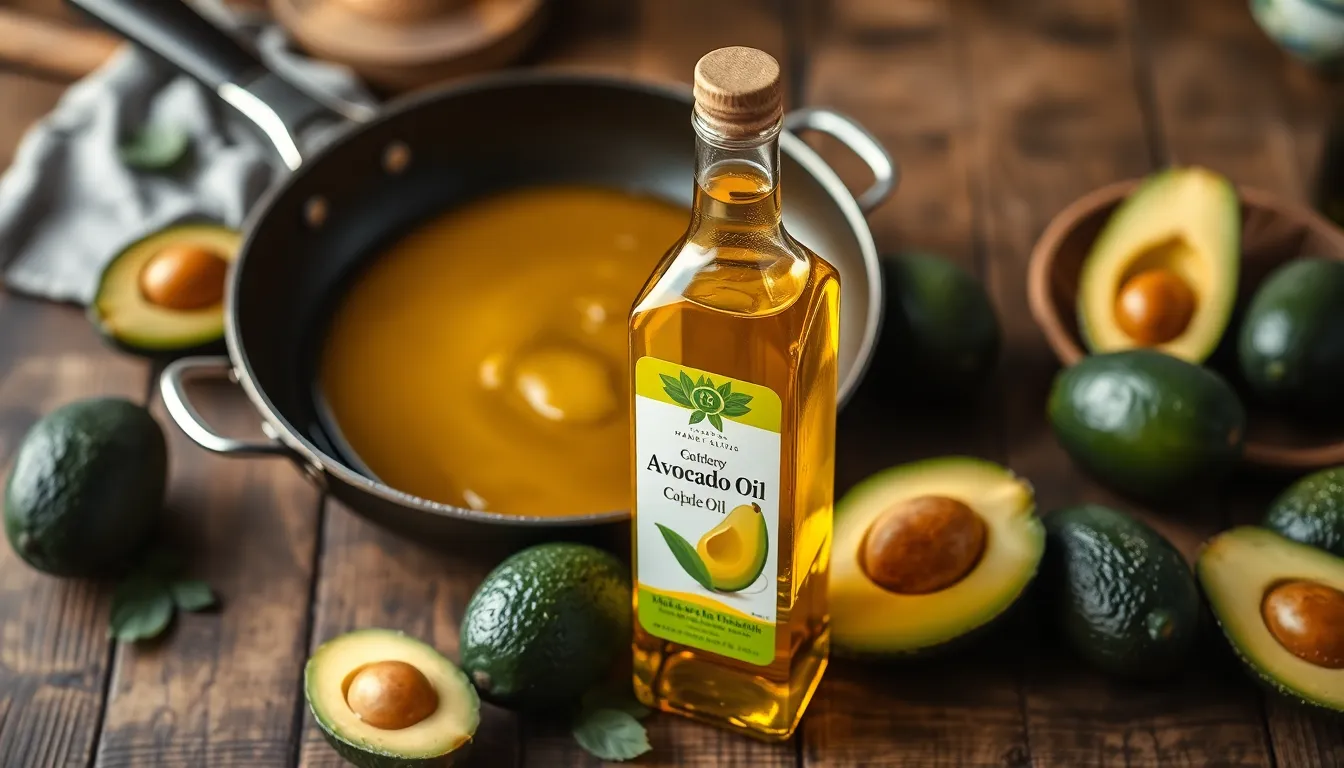Avocado oil has gained popularity in recent years, touted for its health benefits and culinary versatility. As more people seek healthier cooking alternatives, the question arises: is avocado oil good for frying? With its high smoke point and rich nutrient profile, this oil stands out among traditional frying oils.
Frying with avocado oil not only enhances flavors but also adds a nutritional boost to meals. Packed with monounsaturated fats and antioxidants, it offers a heart-healthy choice for those looking to indulge without compromising their wellness. As we delve into the benefits and considerations of using avocado oil for frying, it becomes clear why it’s a favorite in modern kitchens.
Table of Contents
ToggleNutritional Profile of Avocado Oil
Avocado oil boasts a rich nutritional profile that contributes to its popularity in culinary applications. This oil, derived from the fruit of the avocado, contains essential fatty acids, vitamins, and antioxidants beneficial for health.
Healthy Fats and Nutrients
Avocado oil is primarily composed of monounsaturated fats, specifically oleic acid, which accounts for approximately 70% of its total fat content. These healthy fats support heart health by lowering bad cholesterol and raising good cholesterol levels. Additionally, avocado oil contains vitamins E and K. Vitamin E serves as a powerful antioxidant, protecting cells from oxidative damage, while vitamin K promotes proper blood clotting and bone health. Other nutrients include lutein, which is beneficial for eye health, and phytosterols, known for their cholesterol-lowering properties.
Comparison with Other Oils
Avocado oil ranks favorably when compared to other cooking oils. It has a smoke point ranging from 480°F to 520°F (250°C to 271°C), making it suitable for high-heat cooking methods like frying. In contrast, olive oil’s smoke point typically ranges from 350°F to 420°F (175°C to 216°C), which limits its versatility in high-heat scenarios. Coconut oil contains saturated fats that, while stable at high temperatures, lack the heart-healthy benefits found in avocado oil. Ultimately, avocado oil not only offers a higher smoke point but also provides a more nutrient-dense option when compared to many commonly used cooking oils.
Smoke Point of Avocado Oil

Avocado oil boasts a high smoke point, making it suitable for various cooking methods, especially frying. The smoke point ranges between 480°F and 520°F, allowing for versatility in culinary applications.
Importance of Smoke Point in Cooking
Smoke point plays a crucial role in cooking oils. It indicates the temperature at which oil begins to break down, producing smoke and harmful compounds. Using oil below its smoke point ensures flavor preservation and maintains the oil’s health benefits. Oils that exceed their smoke point can generate unwanted flavors and decrease nutritional value. For frying purposes, selecting an oil with a high smoke point, like avocado oil, ensures effective and safe cooking.
Avocado Oil vs. Other Common Oils
Avocado oil surpasses many common oils in both smoke point and health benefits.
| Oil Type | Smoke Point (°F) | Main Fat Type | Nutritional Benefits |
|---|---|---|---|
| Avocado Oil | 480°F – 520°F | Monounsaturated fats | High in vitamins E and K, antioxidants |
| Olive Oil | 375°F – 410°F | Monounsaturated fats | Contains antioxidants and anti-inflammatory properties |
| Coconut Oil | 350°F – 400°F | Saturated fats | Provides medium-chain triglycerides, potential metabolism benefits |
| Canola Oil | 400°F – 450°F | Polyunsaturated fats | High in omega-3 and omega-6 fatty acids |
Avocado oil’s higher smoke point allows it to withstand heat without degradation, making it a favorable option compared to olive and coconut oils. This characteristic, combined with its nutrient density, positions avocado oil as an excellent choice for frying and other high-heat cooking methods.
Health Benefits of Frying with Avocado Oil
Frying with avocado oil offers numerous health benefits, making it a superior choice for cooking. Its unique nutritional composition promotes overall wellness and enhances the flavor of dishes.
Heart Health
Avocado oil supports cardiovascular health due to its high content of monounsaturated fats, primarily oleic acid. Research indicates that oleic acid can lower bad cholesterol (LDL) while boosting good cholesterol (HDL). This positive effect on cholesterol levels reduces the risk of heart disease. Additionally, the oil contains beta-sitosterol, a phytosterol that may help maintain healthy blood pressure levels, further contributing to heart health.
Antioxidant Properties
Avocado oil is rich in antioxidants, including vitamins E and K, which protect the body from oxidative stress. These antioxidants neutralize harmful free radicals, potentially lowering the risk of chronic diseases. Lutein, another compound present in avocado oil, promotes eye health by preventing macular degeneration. Frying foods in avocado oil not only preserves these beneficial antioxidants but also enhances the nutritional value of meals.
Culinary Uses of Avocado Oil
Avocado oil serves multiple culinary purposes, gaining traction among chefs and home cooks alike. Its high smoke point makes it suitable for various cooking methods, especially frying.
Best Dishes for Frying
Fried dishes benefit remarkably from avocado oil. Popular options include:
- Vegetables: Frying vegetables such as zucchini, bell peppers, and sweet potatoes enhances their natural flavors.
- Fish: Avocado oil’s neutral flavor complements fish fillets, resulting in crispy, golden exteriors without overpowering the fish’s taste.
- Chicken: Cooking chicken wings or tenders in avocado oil yields a juicy interior and a crunchy exterior, appealing in taste and texture.
- Potatoes: French fries or roasted potatoes turn crispy and flavorful when fried in avocado oil, providing a healthier alternative to traditional oils.
Flavor Profile and Cooking Techniques
Avocado oil boasts a mild flavor profile, allowing it to enhance the natural tastes of various ingredients without dominating them. It pairs well with diverse cooking techniques, such as:
- Pan-Frying: Ideal for achieving a golden crust on meats or vegetables while preserving moisture.
- Deep-Frying: Suitable for cooking foods at higher temperatures, ensuring crispy outcomes with fewer harmful compounds.
- Sautéing: Used to quickly cook food over medium-high heat, avocado oil maintains its integrity, delivering excellent flavor.
- Roasting: Effective for coating vegetables prior to roasting, promoting enhanced caramelization and a rich, nutty flavor.
Overall, avocado oil’s versatility and nutrient benefits elevate many culinary applications, making it a valuable addition to any kitchen.
Potential Downsides of Avocado Oil for Frying
While avocado oil offers numerous benefits, some downsides exist, particularly concerning cost and availability.
Cost Considerations
Cost can be a significant drawback for those considering avocado oil for frying. Avocado oil typically costs between $10 and $20 per liter, making it pricier than many common cooking oils like vegetable or canola oil. High-quality, organic options may elevate costs even further. Consumers looking for budget-friendly frying solutions may hesitate to choose avocado oil due to its expense.
Availability and Purity Issues
Availability can vary, impacting access to avocado oil. While popular in specialty stores and health food retailers, some regions may lack consistent supply. Additionally, concerns over purity arise, with some products labeled as avocado oil potentially mixed with other oils to reduce production costs. Buyers should verify the product’s quality by checking for certifications or sourcing information to ensure they purchase 100% pure avocado oil.
Avocado oil stands out as an excellent choice for frying due to its high smoke point and impressive nutritional profile. Its heart-healthy monounsaturated fats and antioxidants make it a valuable addition to any kitchen. Whether used for frying vegetables or proteins, it enhances flavors while preserving essential nutrients.
Though it may come with a higher price tag and availability issues, the benefits of using pure avocado oil far outweigh these concerns. By choosing quality products, consumers can enjoy both delicious meals and health perks. As culinary trends continue to evolve, avocado oil’s versatility and health benefits ensure it remains a popular option among chefs and home cooks alike.




